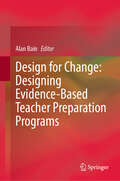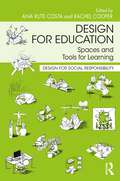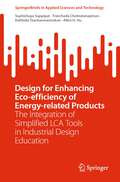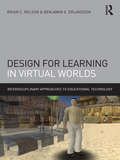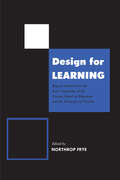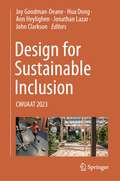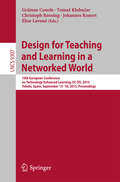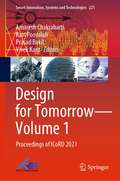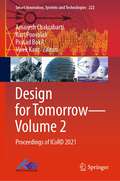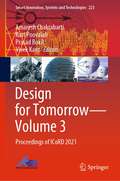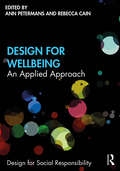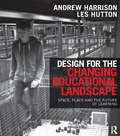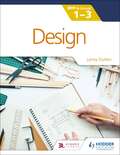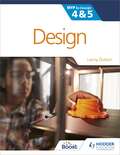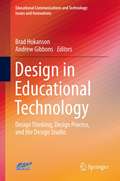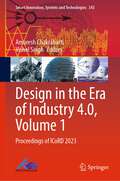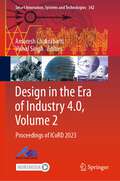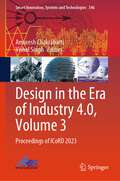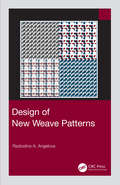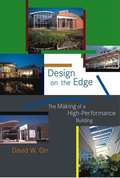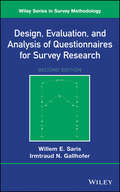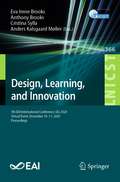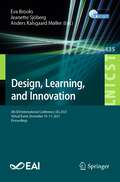- Table View
- List View
Design for Change: Designing Evidence-Based Teacher Preparation Programs
by Alan BainThis book focuses on enhancing teacher education quality by making evidence- informed decisions about policy, assessing quality, establishing effective strategies, and innovating teacher preparation programs. It advocates for the importance of rigorous program design and evaluation as the basis for shaping policy directions and claiming program effectiveness. The book introduces "Design for Change" (DfC), a 20-year-long collaborative effort by a group of teacher educators dedicated to improving their practices. DfC is divided into two parts: Design for Change-Teams and Process (DfC-TaP) and Design for Change-Programs and Courses (DfC-PaC). DfC-TaP explores how to form and sustain a design team of academics, emphasizing the collaborative process's value in program development. DfC-PaC delves into applying practical theory to curriculum design, mapping programs to standards, creating meaningful learning and assessment tasks, and leveraging technology. The latterincludes a chapter on software for teacher preparation program design. The book's ultimate goal is to offer a versatile framework for designing teacher education programs. The book employs evidence from longitudinal research to present generalizable concepts and structures for program developers and designers. By doing so, the book aims to contribute to the field by providing a research-based guide for building teacher education programs that enhance the overall educational experience for both faculty and students.
Design for Education: Spaces and Tools for Learning (ISSN)
by Ana Rute CostaThis book charts the impact of design on education, specifically focusing on how design can shape the spaces and tools for learning.This edited collection brings together the work of designers, architects, engineers, professionals, educators, and researchers, and presents a series of case studies and research developed from across Europe, North America, South America, Africa, Australia, and Asia. The book provides the tools to develop innovative approaches to design for education, and illustrates the conversation and action required to foster socially responsible design for education. As the contributions show, we must look at education as an input and output of a complex system, and we need to adopt an interdisciplinary multiple stakeholder approach, bringing together experts from a range of different fields and backgrounds as a cohesive strategy to improve future learning and teaching environments.Providing guidance and a theoretical framework for designing spaces and tools for learning, this book will be a useful resource for design and architecture students, as well as practitioners, educational researchers, educational practitioners, policymakers, and behaviour and built environment researchers.
Design for Enhancing Eco-efficiency of Energy-related Products: The Integration of Simplified LCA Tools in Industrial Design Education (SpringerBriefs in Applied Sciences and Technology)
by Allen H. Hu Suphichaya Suppipat Treechada Chotiratanapinun Kulthida TeachavorasinskunThis brief textbook underpins the concept of eco-efficiency in product design and systematically addresses the essence of the integration of simplified life cycle assessment (LCA) methods and tools into industrial design. Fundamental steps of LCA-based tools implementation within the higher education context are proposed, using energy-related products (ErP) design as a prime case study. All chapters are designed to respond to the common frequently asked questions in LCA-based tools implementation during the sustainable product design process. The chapters are also enriched with discussions, data sources of simplified LCA tools, and examples of design assignments that provide constructive learning. Some assignments aim at encouraging tool users’ reflections while others tackle particularly at knowledge exchange. The examples can assist the reader to visualize challenges and opportunities to engage learners who are tool users. This textbook broadens LCA knowledge for industrial design and environmental engineering students as well as enhance their sustainable product design performance. For professional practitioners including industrial designers, product engineers, entrepreneurs and the like, this textbook can be used as a guide at the introductory level for integrating life cycle thinking into product design and development.
Design for Learning in Virtual Worlds (Interdisciplinary Approaches to Educational Technology)
by Benjamin E. Erlandson Brian C. NelsonDesign for Learning in Virtual Worlds, the first book focused specifically on how to design virtual worlds for educational purposes, explores: * the history and evolution of virtual worlds * the theories behind the use of virtual worlds for learning * the design of curricula in virtual worlds * design guidelines for elements experienced in virtual worlds that support learning * design guidelines for learning quests and activities in virtual worlds. The authors also examine the theories and associated design principles used to create embedded assessments in virtual worlds. Finally, a framework and methodology is provided to assist professionals in evaluating "off-the-shelf" virtual worlds for use in educational and training settings. Design for Learning in Virtual Worlds will be invaluable both as a professional resource and as a textbook for courses within Educational Technology, Learning Sciences, and Library Media programs that focus on gaming or online learning environments.
Design for Learning: Reports Submitted to the Joint Committee of the Toronto Board of Education and the University of Toronto
by Northrop FryeThis important book is the result of a study of school curriculum undertaken by a joint committee of the University of Toronto and the Board of Education for the City of Toronto. Three sub-committees, dealing with English, Social Science, and Physical Science, here present preliminary reports which indicate the need for perpetual study if the school curriculum is to be kept abreast of modern developments in each discipline. Committee members responsible for the reports are themselves elementary, secondary or university teachers of experience. Their recommendations, embracing all grades up to and including Thirteen, are specific, stimulating and controversial. They are unanimous only in their concern that necessary changes be made and that study of the curriculum be continuous and objective. The reports are prefaced by a discerning essay written by Northrop Frye, Principal Frye points out that "the real barriers to break down were those between the three major divisions of education, the primary, secondary and university levels, each of which tends to become a self-enclosed system, congratulating itself on its virtues and blaming whatever deficiencies the educational process as a whole may have on the other systems." This book will be of interest to teachers at all levels, to officials, responsible for policy in our public education, to trustees, to parents, and to the increasing number of general public who care about education. The Chairmen of the three committees were: English, Mary Campbell (Parkdale Collegiate Institute); Social Science, C.B. Macpherson (Department of Political Economy, University of Toronto); Physical Science, Charlotte M. Sullivan (Department of Zoology, University of Toronto). The Editor, Northrop Frye, is Principal of Victoria College, University of Toronto.
Design for Sustainable Inclusion: CWUAAT 2023
by John Clarkson Jonathan Lazar Ann Heylighen Hua Dong Joy Goodman-DeaneThis book, Design for Sustainable Inclusion, was inspired and informed by the United Nations Sustainable Development Goals. These include, among others, ‘good health and well-being’, ‘reduced inequalities’ and ‘sustainable cities and communities’. Addressing this challenge requires a cross-disciplinary approach and close collaboration with many stakeholders. The Cambridge Workshop on Universal Access and Assistive Technology (CWUAAT) 2023 invited participants from a wide variety of disciplines to contribute to the discussion on this topic.This book represents the papers presented at this conference, chosen by peer review by an international panel of currently active researchers. The chapters within the book provide a unique insight into current national and international research in the fields of inclusive design, universal access, and assistive and rehabilitative technology. The main sections of the book reflect the following key themes:• Understanding people• Designing for an ageing population• Inclusive built environments• Healthcare• Assistive technology• Design methods• Education and trainingWe hope that this book will be useful to researchers, teachers, students and the general public who are interested in inclusive design and sustainable development.
Design for Teaching and Learning in a Networked World: 10th European Conference on Technology Enhanced Learning, EC-TEL 2015, Toledo, Spain, September 15-18, 2015, Proceedings (Lecture Notes in Computer Science #9307)
by Gráinne Conole Johannes Konert Tomaž Klobučar Christoph Rensing Élise LavouéThis book constitutes the refereed proceedings of the 10th European Conference on Technology Enhanced Learning, EC-TEL 2015, held in Toledo, Spain, in September 2015. The 27 full papers, 19 short papers, 9 demo papers and 23 posters were carefully reviewed and selected from 176 submissions. They address topics such as blended learning; self-regulated and self directed learning; reflective learning; intelligent learning systems; learning communities; learning design; learning analytics; learning assessment; personalization and adaptation; serious games; social media; massive open online courses (MOOCs); schools of the future.
Design for Tomorrow—Volume 1: Proceedings of ICoRD 2021 (Smart Innovation, Systems and Technologies #221)
by Amaresh Chakrabarti Ravi Poovaiah Prasad Bokil Vivek KantThis book showcases cutting-edge research papers from the 8th International Conference on Research into Design (ICoRD 2021) written by eminent researchers from across the world on design processes, technologies, methods and tools, and their impact on innovation, for supporting design for a connected world. The theme of ICoRD‘21 has been “Design for Tomorrow”. The world as we know it in our times is increasingly becoming connected. In this interconnected world, design has to address new challenges of merging the cyber and the physical, the smart and the mundane, the technology and the human. As a result, there is an increasing need for strategizing and thinking about design for a better tomorrow. The theme for ICoRD’21 serves as a provocation for the design community to think about rapid changes in the near future to usher in a better tomorrow. The papers in this book explore these themes, and their key focus is design for tomorrow: how are products and their development be addressed for the immediate pressing needs within a connected world? The book will be of interest to researchers, professionals and entrepreneurs working in the areas on industrial design, manufacturing, consumer goods, and industrial management who are interested in the new and emerging methods and tools for design of new products, systems and services.
Design for Tomorrow—Volume 2: Proceedings of ICoRD 2021 (Smart Innovation, Systems and Technologies #222)
by Amaresh Chakrabarti Ravi Poovaiah Prasad Bokil Vivek KantThis book showcases cutting-edge research papers from the 8th International Conference on Research into Design (ICoRD 2021) written by eminent researchers from across the world on design processes, technologies, methods and tools, and their impact on innovation, for supporting design for a connected world. The theme of ICoRD‘21 has been “Design for Tomorrow”. The world as we know it in our times is increasingly becoming connected. In this interconnected world, design has to address new challenges of merging the cyber and the physical, the smart and the mundane, the technology and the human. As a result, there is an increasing need for strategizing and thinking about design for a better tomorrow. The theme for ICoRD’21 serves as a provocation for the design community to think about rapid changes in the near future to usher in a better tomorrow. The papers in this book explore these themes, and their key focus is design for tomorrow: how are products and their development be addressed for the immediate pressing needs within a connected world? The book will be of interest to researchers, professionals and entrepreneurs working in the areas on industrial design, manufacturing, consumer goods, and industrial management who are interested in the new and emerging methods and tools for design of new products, systems and services.
Design for Tomorrow—Volume 3: Proceedings of ICoRD 2021 (Smart Innovation, Systems and Technologies #223)
by Amaresh Chakrabarti Ravi Poovaiah Prasad Bokil Vivek KantThis book showcases cutting-edge research papers from the 8th International Conference on Research into Design (ICoRD 2021) written by eminent researchers from across the world on design processes, technologies, methods and tools, and their impact on innovation, for supporting design for a connected world. The theme of ICoRD‘21 has been “Design for Tomorrow”. The world as we know it in our times is increasingly becoming connected. In this interconnected world, design has to address new challenges of merging the cyber and the physical, the smart and the mundane, the technology and the human. As a result, there is an increasing need for strategizing and thinking about design for a better tomorrow. The theme for ICoRD’21 serves as a provocation for the design community to think about rapid changes in the near future to usher in a better tomorrow. The papers in this book explore these themes, and their key focus is design for tomorrow: how are products and their development be addressed for the immediate pressing needs within a connected world? The book will be of interest to researchers, professionals and entrepreneurs working in the areas on industrial design, manufacturing, consumer goods, and industrial management who are interested in the new and emerging methods and tools for design of new products, systems and services.
Design for Wellbeing: An Applied Approach (Design for Social Responsibility)
by Ann Petermans Rebecca CainDesign for Wellbeing charts the development and application of design research to improve the personal and societal wellbeing and happiness of people. It draws together contributions from internationally leading academics and designers to demonstrate the latest thinking and research on the design of products, technologies, environments, services and experiences for wellbeing. Part I starts by conceptualising wellbeing and takes an in-depth look at the rise of the design for wellbeing movement. Part II then goes on to demonstrate design for wellbeing in practice through a broad range of domains from products and environments to services. Among others, we see emerging trends in the design of interiors and urban spaces to support wellbeing, designing to enable and support connectedness and social interaction, and designing for behaviour change to tackle unhealthy eating behaviour in children. Significantly, the body of work on subjective wellbeing, design for happiness, is increasing, and several case studies are provided on this, demonstrating how design can contribute to support the wellbeing of people. Part III provides practical guidance for designing for wellbeing through a range of examples of tools, methods and approaches, which are highly user-centric, participatory, critical and speculative. Finally, the book concludes in Part IV with a look at future challenges for design for wellbeing. This book provides students, researchers and practitioners with a detailed assessment of design for wellbeing, taking a distinctive global approach to design practice and theory in context. Design for Wellbeing concerns designers and organisations but also defines its broader contribution to society, culture and economy.
Design for the Changing Educational Landscape: Space, Place and the Future of Learning
by Andrew Harrison Les HuttonThe whole landscape of space use is undergoing a radical transformation. In the workplace a period of unprecedented change has created a mix of responses with one overriding outcome observable worldwide: the rise of distributed space. In the learning environment the social, political, economic and technological changes responsible for this shift have been further compounded by constantly developing theories of learning and teaching, and a wide acceptance of the importance of learning as the core of the community, resulting in the blending of all aspects of learning into one seamless experience. This book attempts to look at all the forces driving the provision and pedagogic performance of the many spaces, real and virtual, that now accommodate the experience of learning and provide pointers towards the creation and design of learning-centred communities. Part 1 looks at the entire learning universe as it now stands, tracks the way in which its constituent parts came to occupy their role, assesses how they have responded to a complex of drivers and gauges their success in dealing with renewed pressures to perform. It shows that what is required is innovation within the spaces and integration between them. Part 2 finds many examples of innovation in evidence across the world – in schools, the higher and further education campus and in business and cultural spaces – but an almost total absence of integration. Part 3 offers a model that redefines the learning landscape in terms of learning outcomes, mapping spatial requirements and activities into a detailed mechanism that will achieve the best outcome at the most appropriate scale. By encouraging stakeholders to creating an events-based rather than space-based identity, the book hopes to point the way to a fully-integrated learning landscape: a learning community.
Design for the IB MYP 1-3: By Concept
by Lenny DuttonEnsure your students navigate the MYP framework with confidence using a concept-driven and assessment-focused approach to Design, presented in global contexts. - Develop conceptual understanding with key concepts and related concepts, set in global contexts, at the heart of each chapter. -Prepare for every aspect of assessment using support and tasks designed by an experienced educator. - Extend learning through research projects and interdisciplinary opportunities. - Apply global contexts in meaningful ways with an internationally-minded perspective. - Develop practical and creative-thinking skills to solve design problems with a statement of inquiry in each chapter. - Confidently cover the framework with chapters covering digital, product and combined design.
Design for the IB MYP 1-3: By Concept
by Lenny DuttonEnsure your students navigate the MYP framework with confidence using a concept-driven and assessment-focused approach to Design, presented in global contexts. - Develop conceptual understanding with key concepts and related concepts, set in global contexts, at the heart of each chapter. -Prepare for every aspect of assessment using support and tasks designed by an experienced educator. - Extend learning through research projects and interdisciplinary opportunities. - Apply global contexts in meaningful ways with an internationally-minded perspective. - Develop practical and creative-thinking skills to solve design problems with a statement of inquiry in each chapter. - Confidently cover the framework with chapters covering digital, product and combined design.
Design for the IB MYP 4&5: By Concept
by Lenny DuttonEnsure your students navigate the MYP framework with confidence using a concept-driven and assessment-focused approach to Design, presented in global contexts. - Develop conceptual understanding with key concepts and related concepts, set in global contexts, at the heart of each chapter. -Prepare for every aspect of assessment using support and tasks designed by an experienced educator. - Extend learning through research projects and interdisciplinary opportunities. - Apply global contexts in meaningful ways with an internationally-minded perspective. - Develop practical and creative-thinking skills to solve design problems with a statement of inquiry in each chapter. - Confidently cover the framework with chapters covering digital, product and combined design.Table Content: Unit 1 Global Goals Design Challenge Unit 2 Design to help people express their emotions Unit 3 Playground design Unit 4 Lights change lives Unit 5 Service promotion Unit 6 Gamified exercise Unit 7 Pedestrian safety Unit 8 The importance of toilets Unit 9 Human impact animation Unit 10 Play with the past Unit 11 Dealing with change Unit 12 Turning drawings into products
Design for the IB MYP 4&5: By Concept (MYP By Concept)
by Lenny DuttonEnsure your students navigate the MYP framework with confidence using a concept-driven and assessment-focused approach to Design, presented in global contexts. - Develop conceptual understanding with key concepts and related concepts, set in global contexts, at the heart of each chapter. -Prepare for every aspect of assessment using support and tasks designed by an experienced educator. - Extend learning through research projects and interdisciplinary opportunities. - Apply global contexts in meaningful ways with an internationally-minded perspective. - Develop practical and creative-thinking skills to solve design problems with a statement of inquiry in each chapter. - Confidently cover the framework with chapters covering digital, product and combined design.Table Content: Unit 1 Global Goals Design Challenge Unit 2 Design to help people express their emotions Unit 3 Playground design Unit 4 Lights change lives Unit 5 Service promotion Unit 6 Gamified exercise Unit 7 Pedestrian safety Unit 8 The importance of toilets Unit 9 Human impact animation Unit 10 Play with the past Unit 11 Dealing with change Unit 12 Turning drawings into products
Design in Educational Technology: Design Thinking, Design Process, and the Design Studio
by Brad Hokanson Andrew GibbonsThis book is the result of a research symposium sponsored by the Association for Educational Communications and Technology [AECT]. The fifteen chapters were developed by leaders in the field and represent the most updated and cutting edge methodology in the areas of instructional design and instructional technology. The broad concepts of design, design thinking, the design process, and the design studio, are identified and they form the framework of the book. This book advocates the conscious adoption of a mindset of design thinking, such as that evident in a range of divergent professions including business, government, and medicine. At its core is a focus on "planning, inventing, making, and doing." (Cross, 1982), all of which are of value to the field of educational technology. Additionally, the book endeavors to develop a deep understanding of the design process in the reader. It is a critical skill, often drawing from other traditional design fields. An examination of the design process as practiced, of new models for design, and of ways to connect theory to the development of educational products are all fully explored with the goal of providing guidance for emerging instructional designers and deepening the practice of more advanced practitioners. Finally, as a large number of leading schools of instructional design have adopted the studio form of education for their professional programs, we include this emerging topic in the book as a practical and focused guide for readers at all levels.
Design in the Era of Industry 4.0, Volume 1: Proceedings of ICoRD 2023 (Smart Innovation, Systems and Technologies #343)
by Amaresh Chakrabarti Vishal SinghThis book showcases cutting-edge research papers from the 9th International Conference on Research into Design (ICoRD 2023) – the largest in India in this area – written by eminent researchers from across the world on design processes, technologies, methods and tools, and their impact on innovation, for supporting design for a connected world. The theme of ICoRD’23 has been ‘Design in the Era of Industry 4.0’. Industry 4.0 signifies the fourth industrial revolution. The first industrial revolution was driven by the introduction of mechanical power such as steam and water engines to replace human and animal labour. The second industrial revolution involved introduction of electrical power and organised labour. The third industrial revolution was powered by introduction of industrial automation. The fourth industrial revolution involves introduction of a combination of technologies to enable connected intelligence and industrial autonomy. The introduction of Industry 4.0 dramatically changes the landscape of innovation, and the way design, the engine of innovation, is carried out. The theme of ICoRD’23 - ‘Design in the Era of Industry 4.0’ –explores how Industry 4.0 concepts and technologies influence the way design is conducted, and how methods, tools, and approaches for supporting design can take advantage of this transformational change that is sweeping across the world. The book is of interest to researchers, professionals, and entrepreneurs working in the areas on industrial design, manufacturing, consumer goods, and industrial management who are interested in the new and emerging methods and tools for design of new products, systems, and services.
Design in the Era of Industry 4.0, Volume 2: Proceedings of ICoRD 2023 (Smart Innovation, Systems and Technologies #342)
by Amaresh Chakrabarti Vishal SinghThis book showcases cutting-edge research papers from the 9th International Conference on Research into Design (ICoRD 2023) – the largest in India in this area – written by eminent researchers from across the world on design processes, technologies, methods and tools, and their impact on innovation, for supporting design for a connected world. The theme of ICoRD’23 has been ‘Design in the Era of Industry 4.0’. Industry 4.0 signifies the fourth industrial revolution. The first industrial revolution was driven by the introduction of mechanical power such as steam and water engines to replace human and animal labour. The second industrial revolution involved introduction of electrical power and organised labour. The third industrial revolution was powered by introduction of industrial automation. The fourth industrial revolution involves introduction of a combination of technologies to enable connected intelligence and industrial autonomy. The introduction of Industry 4.0 dramatically changes the landscape of innovation, and the way design, the engine of innovation, is carried out. The theme of ICoRD’23 - ‘Design in the Era of Industry 4.0’ –explores how Industry 4.0 concepts and technologies influence the way design is conducted, and how methods, tools, and approaches for supporting design can take advantage of this transformational change that is sweeping across the world. The book is of interest to researchers, professionals, and entrepreneurs working in the areas on industrial design, manufacturing, consumer goods, and industrial management who are interested in the new and emerging methods and tools for design of new products, systems, and services.
Design in the Era of Industry 4.0, Volume 3: Proceedings of ICoRD 2023 (Smart Innovation, Systems and Technologies #346)
by Amaresh Chakrabarti Vishal SinghThis book showcases cutting-edge research papers from the 9th International Conference on Research into Design (ICoRD 2023) – the largest in India in this area – written by eminent researchers from across the world on design processes, technologies, methods and tools, and their impact on innovation, for supporting design for a connected world. The theme of ICoRD’23 has been ‘Design in the Era of Industry 4.0’. Industry 4.0 signifies the fourth industrial revolution. The first industrial revolution was driven by the introduction of mechanical power such as steam and water engines to replace human and animal labour. The second industrial revolution involved introduction of electrical power and organised labour. The third industrial revolution was powered by introduction of industrial automation. The fourth industrial revolution involves introduction of a combination of technologies to enable connected intelligence and industrial autonomy. The introduction of Industry 4.0 dramatically changes the landscape of innovation, and the way design, the engine of innovation, is carried out. The theme of ICoRD’23 - ‘Design in the Era of Industry 4.0’ –explores how Industry 4.0 concepts and technologies influence the way design is conducted, and how methods, tools, and approaches for supporting design can take advantage of this transformational change that is sweeping across the world. The book is of interest to researchers, professionals, and entrepreneurs working in the areas on industrial design, manufacturing, consumer goods, and industrial management who are interested in the new and emerging methods and tools for design of new products, systems, and services.
Design of New Weave Patterns
by Radostina A. AngelovaThis book presents a systematic study on methods used for the creation of weave patterns for simple structures. Firstly, it explains known techniques for designing new weave patterns classified as patterns merge, motifs, patterns insertion and change of the displacement number. These are discussed as possibilities to create different textures and weaving effects supported by figures of patterns, colour view, and fabric appearance simulation. Secondly, it explains original methods for design of new weave patterns based on Boolean operations, musical scores, written texts and braille alphabet, including transformations performed, advantages/disadvantages, possible applications and designs.
Design, Evaluation, and Analysis of Questionnaires for Survey Research
by Willem E. Saris Irmtraud N. GallhoferDesign, Evaluation, and Analysis of Questionnaires for Survey Research, Second Edition explores updates on the statistical knowledge and development of survey questionnaires, including analyzing the important decisions researchers make throughout the survey design process. The new edition provides coverage of an updated SQP program, which has an expanded question database from the Multi-trait Multi-method (MTMM) experiments. This book aims to give students and survey researchers a state-of-the-art introduction to questionnaire design and how to construct questionnaires with the highest relevance and accuracy. The pitfalls of questionnaire design are outlined throughout the book, which alerts designers of questionnaires to the many prior decisions that will affect the quality of the research outcome. It is important to measure the quality of questions at the outset in order for students and researchers to consider the consequences and methods of achieving reliable and effective questions.
Design, Learning, and Innovation: 5th EAI International Conference, DLI 2020, Virtual Event, December 10-11, 2020, Proceedings (Lecture Notes of the Institute for Computer Sciences, Social Informatics and Telecommunications Engineering #366)
by Cristina Sylla Anthony Brooks Eva Irene Brooks Anders Kalsgaard MøllerThis book constitutes the refereed post-conference proceedings the 5th EAI International Conference on DLI 2020, Design, Leaning and Innovation, which took place in December 2020. Due to COVID-19 pandemic the conference was held virtually. The 14 revised full papers presented were carefully selected from 40 submissions and are organized in four thematic sessions on: digital technologies and learning; designing for innovation; digital games, gamification and robots; designs for innovative learning.
Design, Learning, and Innovation: 6th EAI International Conference, DLI 2021, Virtual Event, December 10-11, 2021, Proceedings (Lecture Notes of the Institute for Computer Sciences, Social Informatics and Telecommunications Engineering #435)
by Eva Brooks Anders Kalsgaard Møller Jeanette SjöbergThis book constitutes the refereed post-conference proceedings the 6th EAI International Conference on Design, Leaning and Innovation, DLI 2021, which took place in December 2021. Due to COVID-19 pandemic the conference was held virtually. The theme for DLI 2021 was “Shifting boundaries to discover novel ways and emerging technologies to realise human needs, ideas, and desires” targeting a conceptualisation of the effects and impact of digital technologies for, in an inclusive and playful way, fostering human beings to realising their needs, ideas and desires. The 17 revised full papers presented were carefully selected from 36 submissions and are organized in four thematic sessions on: digital technologies, design and learning; tools and models; artificial intelligence, virtual reality and augmented reality in learning; innovative designs and learning.
